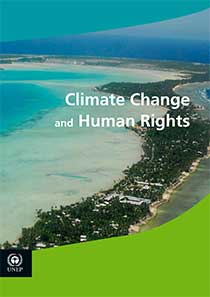Climate Change and Human Rights
This UNEP report sheds light on the human rights obligations of both governments and private actors in responding to climate change, including those relating to rights to information,
public participation in decision-making and access to justice, as well as obligations relating to adaption and mitigation.
The report makes a number of recommendations on how governments and other actors may address climate change. These include the need to recognize the link between climate change and human rights in climate-related processes and activities. The report also highlights the need for greater ambition with regard to mitigation, human rights safeguards for international climate finance mechanisms, financial assistance for developing countries faced with adaptation, and the development of an international mechanism on climate-induced displacement and
migration. In addition, the report proposes a number of new human rights-related mechanisms for international coordination and accountability in delivering these outcomes.
